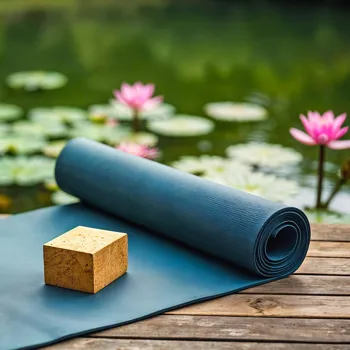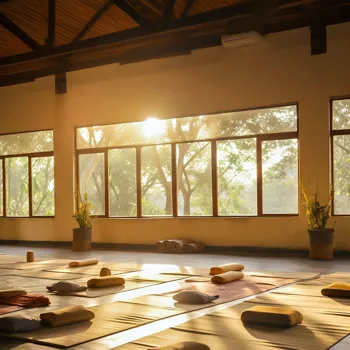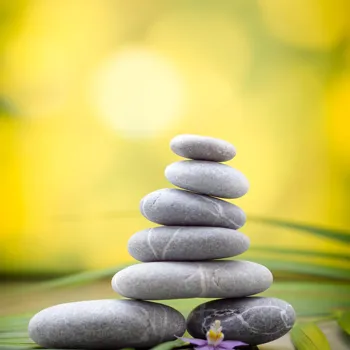Discover the power of mindfulness meditation for stress relief. Learn how to find peace in a chaotic world. Read more
Shanti Please! Why Mindfulness Meditation is Your New Best Friend for Stress Relief

Mindfulness meditation: a free tool to combat stress
In today's fast-paced world, stress has become as common as chai in India. We're constantly bombarded with deadlines, traffic jams that test our patience, and the never-ending buzz of social media. This constant pressure can leave us feeling overwhelmed, anxious, and generally out of sync.

But what if there was a simple, accessible, and completely free tool to combat this stress? Enter mindfulness meditation – your new best friend for finding inner peace.
Mindfulness meditation: focus on the present moment for calm
Mindfulness meditation is more than just sitting cross-legged and chanting 'om'. It's a powerful technique that involves focusing your attention on the present moment without judgment.

It's about observing your thoughts, feelings, and bodily sensations as they arise, without getting carried away by them. Think of it like watching a river flow. You see the leaves, the twigs, and the water without trying to stop or change anything.
This practice allows you to create space between yourself and your thoughts, giving you a sense of calm and control amidst the chaos. It is like finding an island of peace in the middle of a stormy sea, a moment to reconnect with yourself.
Mindfulness meditation boosts brain function and reduces stress
Now, you might be thinking, "Meditation? That sounds a bit too 'woo-woo' for me." But the benefits of mindfulness meditation are backed by solid scientific evidence.

Studies have shown that regular practice can actually change the structure and function of the brain, particularly in areas associated with stress, anxiety, and emotional regulation.
For example, research has demonstrated that mindfulness meditation can reduce activity in the amygdala, the brain's "fear center," while increasing activity in the prefrontal cortex, the area responsible for reasoning and decision-making.
It’s like giving your brain a much-needed tune-up, optimizing its performance and resilience.
Mindfulness meditation lowers cortisol levels to improve health
Furthermore, mindfulness meditation has been shown to lower cortisol levels, the hormone associated with stress. Chronic stress can lead to a host of health problems, including high blood pressure, weakened immunity, and even heart disease.

By reducing cortisol, mindfulness meditation can help protect your physical health and improve your overall well-being. So, it's not just about feeling calmer; it's about taking proactive steps to safeguard your long-term health.
This is like having a daily dose of mental and physical medicine all combined.
Practice mindfulness meditation anywhere, anytime with minimal requirements
The beauty of mindfulness meditation is that it's incredibly accessible. You don't need any special equipment, expensive classes, or a secluded mountaintop retreat to get started. All you need is a quiet space, a few minutes of your time, and a willingness to give it a try.

Begin by finding a comfortable posture, either sitting in a chair with your feet flat on the floor or sitting cross-legged on a cushion. Close your eyes gently and bring your attention to your breath. Notice the sensation of the air entering and leaving your body.
Pay attention to the rise and fall of your chest or abdomen.
Practice mindfulness meditation with patience and persistence for self-discovery
As you focus on your breath, you will inevitably notice that your mind begins to wander. This is perfectly normal. Don't get frustrated or judge yourself. Simply acknowledge the thought or feeling, and gently redirect your attention back to your breath. The key is to be patient and persistent.

Like any skill, mindfulness meditation takes practice. Start with just 5-10 minutes a day and gradually increase the duration as you become more comfortable. You can find guided meditations online or through apps, which can be especially helpful for beginners.
This is a journey, not a destination, so enjoy the process of self-discovery.
Practice mindfulness in daily tasks for awareness & appreciation
Mindfulness isn't just something you do during formal meditation sessions. It's a way of being that you can integrate into your everyday life. Try practicing mindfulness while you're doing simple tasks like washing dishes, eating a meal, or walking to work.

Pay attention to the sensations of your hands in the water, the taste of the food on your tongue, or the feeling of your feet on the ground. The point is to be fully present in whatever you're doing, instead of letting your mind wander to the past or the future.
This can transform mundane activities into opportunities for cultivating awareness and appreciation.
Mindful observation of emotions builds emotional resilience
Another helpful technique is to practice mindful observation of your emotions. When you feel stressed, angry, or anxious, take a moment to pause and observe the physical sensations in your body. Notice where you feel the tension, the heat, or the tightness.

Instead of getting swept away by the emotion, simply acknowledge it and allow it to pass. This can help you to develop a greater sense of emotional resilience and avoid reacting impulsively. It's like learning to ride the waves of your emotions without getting drowned by them.
Dealing with distractions in mindfulness meditation
One of the biggest challenges of mindfulness meditation is dealing with distractions. Our minds are naturally restless, constantly jumping from one thought to another. This is sometimes referred to as "monkey mind." Don't be discouraged by this. It's a normal part of the process.

The key is to learn how to gently redirect your attention back to your breath or your chosen object of focus. When you notice your mind wandering, simply acknowledge the thought without judgment and gently guide your attention back to the present.
Experiment with various techniques to enhance focus; use breath counting, mantras, body parts, be patient
Experiment with different techniques to help you stay focused. Some people find it helpful to count their breaths. Others find it helpful to use a mantra, a word or phrase that you repeat silently to yourself.

You can also try focusing on different parts of your body, such as your toes, your fingers, or your ears. The goal is to find what works best for you and to be patient with yourself as you develop your ability to focus.
Remember, it's not about eliminating distractions altogether; it's about learning how to work with them.
Mindfulness meditation offers long-term benefits for well-being and resilience
While you may experience some immediate benefits from mindfulness meditation, such as a reduction in stress and anxiety, the real power of the practice lies in its long-term effects.

Over time, regular mindfulness meditation can help you to develop a greater sense of self-awareness, emotional regulation, and resilience.
You'll become more attuned to your thoughts, feelings, and bodily sensations, and you'll be better able to respond to life's challenges with grace and equanimity. This can lead to more fulfilling relationships, improved performance at work, and a greater sense of overall well-being.
Mindfulness meditation: journey of self-discovery & presence
Ultimately, mindfulness meditation is a journey of self-discovery. It's about learning to connect with yourself on a deeper level and to cultivate a greater sense of presence and appreciation for the present moment. It is a skill, and like all skills, it improves with practice.

Invest a small amount of time and you would be grateful you did. Give it a try and experience the shanti for yourself! You might just surprise yourself with the peace and clarity you discover within.
Mindfulness meditation eases stress for better well-being
We all deal with stress throughout our life, and while it is not easy to eliminate, mindfulness meditation is a great tool to handle stressful situations. This is an accessible way to reduce the impact of stress on the body and improve well being.

Remember, taking the time to breathe and embrace the present moment is not selfish, but an act of self-care that helps you navigate the complexities of life with grace and resilience.
AI Generated Content. Glance/InMobi shall have no liability for the content















